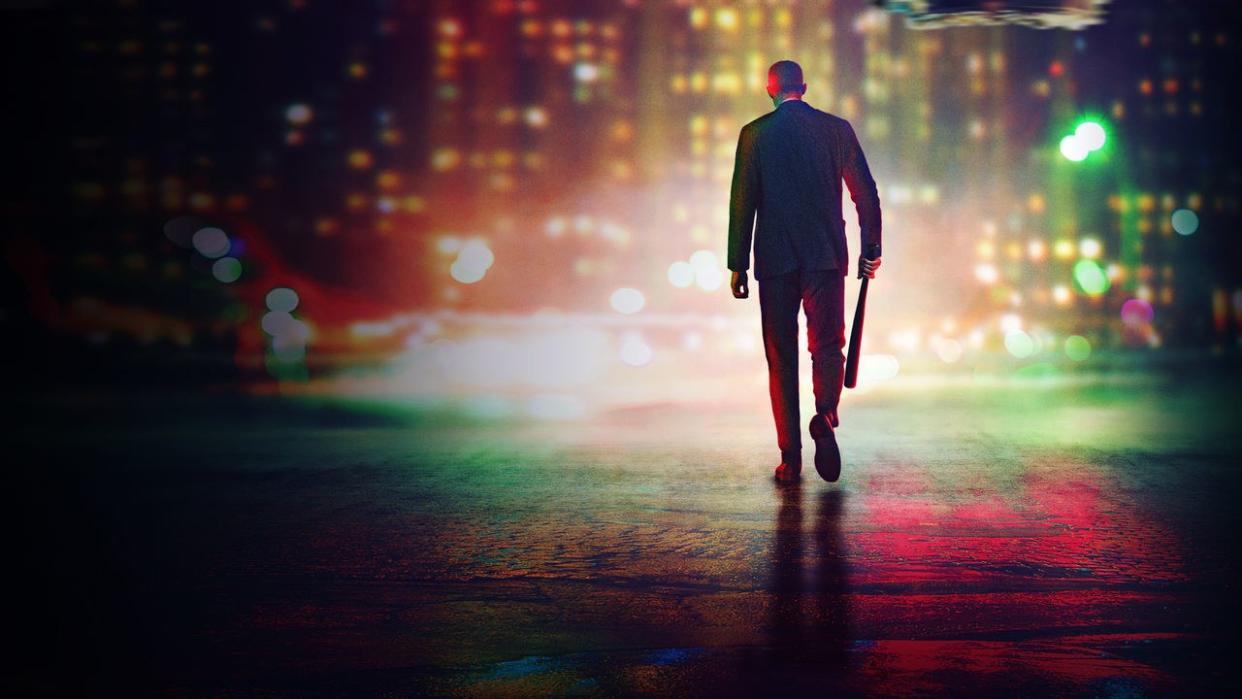Mute Review: That’s No Moon

There's a scene I think about a lot in Martin McDonagh's meta-comedy Seven Psychopaths. In it, Christopher Walken chastises Colin Farrell's terrible screenplay. "Your women characters are awful," Walken says. "None of them have anything to say for themselves. Most of them get shot or stabbed to death within five minutes, and the ones that don't probably will later on."
"It's a hard world for women," Farrell's character explains. "And I guess that's what I'm trying to say."
"Yeah, it's a hard world for women. But most of the ones I know can string a sentence together."
The scene captures the most pervasive problem with lazy, male writing: in trying to subvert the sexist tropes, often times those movies end up perpetuating those same things.
This, among many other things, is a major problem with Duncan Jones's new film Mute, an attempted pastiche of the hardboiled noir thrillers that finds itself more derivative than inspired, more damaging than subversive, and more bad than good. It is a film that is hard to like and, given the accomplishments of its filmmaker and cast, Mute is a disappointment.
Duncan Jones has proven himself at handling some of the toughest obstacles a film director can face: He overcame Famous Dad Syndrome to create his quiet masterpiece, Moon. He took charge of an outlandish and silly sci-fi script and made a shockingly good, entertaining original Hollywood movie in Source Code. He made Warcraft watchable, which, honestly, is the best we could have hoped for.
Sadly, Duncan Jones could not contend with himself. More than fifteen years of gestation clearly did nothing for Mute, by far his worst film to date, and easily one of the worst in recent memory, period. The most charitable interpretation of Mute is that Jones simply had to get this idea out of his system so he can go on to make new, better films, and that it, at the very least, serves to make The Cloverfield Paradox no longer Netflix's worst high-profile sci-fi misfire this month. A more realistic one is that this is an ill-conceived, dull, and often offensive film that tarnishes not only the world it shares with Moon, but the reputation of a so-far promising genre filmmaker.
Mute, set forty years from now in Berlin, recalls Blade Runner pretty much from start to finish. This is, in fact, one step away from a complete rip-off, save for the merciful lack of advanced android tech. Alexander Skarsgård plays Leo, a bartender whose vocal cords were damaged in a childhood accident, rendering him, you know. One day, his blue-haired girlfriend, Naadirah (Seyneb Saleh, also a bartender) goes missing, and Leo finds himself dragged into a terribly tedious conspiracy that clocks in at an outrageous two hours, and still feels much longer.
Even with just a few minutes screen time, Leo's completely emotionless cipher of a loving girlfriend is by far Mute's most defined female character. His urgency in hunting her down is hampered by the fact the relationship was so ill-defined from the beginning. It's truly impossible to tell if they've been dating for two weeks or two years, and their chemistry is so limited that, near the beginning, when Naadirah tells Leo she loves him, I felt it a little too soon for her to be saying such things.
There are salvageable aspects of Mute, few and far between as they may be. The set design and realization of the seedy, futuristic Berlin are remarkable, as sleek tech and pleasingly boxy phones and cars jut up against one another. Clint Mansell, the composer of Moon, returns too with a fantastic, engaging score. These touches help to sell the world, if not the film itself.
It would help, too, if Jones and fellow screenwriter Michael Robert Johnson, who also shoulders half the blame, had the inclination to even attempt one interesting idea based on Leo's muteness, the literal headline to the entire film. One short scene in which Leo can't use a phone is all we get. Lots of seminal action heroes don't talk, but here is one who can't. That's a cool idea, and it isn't explored in the slightest. Instead, Leo's muteness serves as nothing but a "badass" touch to a character correctly identified as sorely needing a schtick, given Skarsgård's tepid performance.
Doing the talking here instead are two black market American surgeons, Cactus Bill and Duck –played by Paul Rudd and Justin Theroux, who make good use of their chemistry and comedy bona fides to bring some effective, unrehearsed levity to some corners of Mute. That is until a dreadfully tasteless (and needless!) subplot ruins that, too. If there is redemption to this film, it comes in Rudd and Theroux's easy partnership and some impressive set design work. But that's about it. Bill's preteen daughter, who herself doesn't speak, makes for the second most realized female character in the whole thing. That might be a good thing. It's hard exactly to tell what Jones intends to explore in terms of this film's obsession with sex workers and violence against women.
There is talent running through this film, but try as everyone might, far too little of it translates. Just because the movie is called Mute doesn't mean it shouldn't have something to say.

